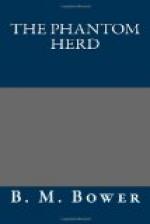“Ah—Mr. Brown, this is Mr. Lindsay, ah—director who is producing your stories.” Martinson’s tone was as neutral as he could make it.
Luck said that he was glad to meet Mr. Brown, which was a lie. At the same instant he found the stitched-down bow on his hat, and from there felt his way to the front. At the same time he decided that there was going to be something doing presently, if Mart’s manner meant anything at all. Mart was a peaceable soul, and in the approaching crisis Luck knew he would climb hurriedly upon the fence of neutrality and stay there; and Luck could fight or climb a tree as he chose.
They went outside, and Luck turned his eyes sidewise and took a look at Bently Brown. He measured him mentally from pigskin puttees to rakish, stiff brimmed Stetson with careful dimples in the crown and a leather hatband stamped with horses’ heads and his initials. In a picture, Luck would have cast Bently Brown, costume and all, for a comedy mining engineer or something of that sort. You know the type: He arrives on the stage that is held up, and is always in the employ of the monied octopus, and the cowboys who pursue and capture the bandits have fun afterwards with the engineer,—so much fun that he crawls out of an up-stairs window in the night and departs hastily and forever from that place. You are perfectly familiar with the character, I am sure.
Luck, after that swift, comprehensive glance, was not greatly alarmed. In that he made his greatest blunder. He should have reckoned with the wounded vanity of the little author who believes himself great. He should have reminded himself that Bently Brown was not a comedy mining engineer, but that touchiest of all mortals, the nearly successful author. He should have taken warning from the stiff-necked, stiff-backed gait of Bently Brown on the short walk to the office. He should have read danger in the blinking lids of his pale eyes, and in his self-conscious manner of looking straight before him.
In the office, then, luck basely deserted one Luck Lindsay, and left him to fight a losing battle. For Bently Brown was incensed, insulted, and outraged over the manner in which The Soul of Littlefoot Law had been filmed. The story had been caricatured out of all semblance to its original self. Littlefoot Law had been shown as having no soul whatever. Instead of being permitted to make the final, supreme sacrifice of his life for the honor of his enemy,—which would have revealed to the audience his possession of a clean white soul in spite of his bad character,—he had been made out a little fiend who would shoot you on the slightest provocation. The girl had been thrust into the background, and the hero had been made into a coward and a paltry villain; they were all desperadoes upon the screen. Never in his life had Bently Brown been made to suffer such an affront. Never had he dreamed that his work would be made a thing to laugh at—




